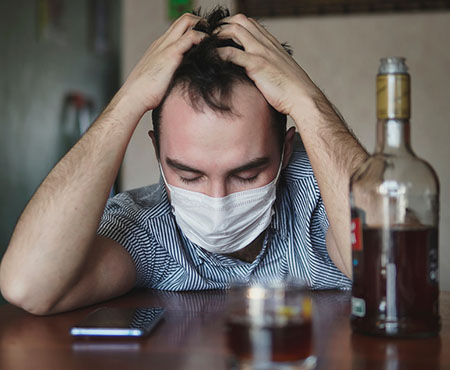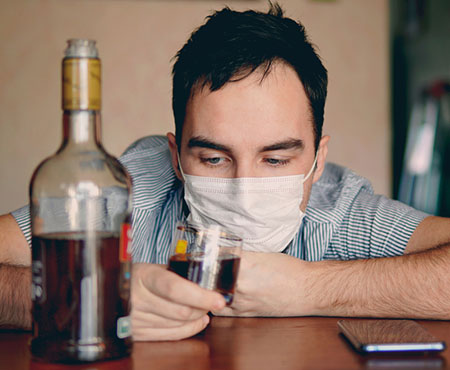
At the end of May, Rospotrebnadzor issued an official statement that alcohol cannot help in the fight against coronavirus infection. Moreover, it aggravates the problem, and together with the virus, it causes a double blow to the body. Note that the speech was provoked by the myth that supposedly alcoholic beverages are able to treat a viral infection. In fact, on the contrary, alcohol has a negative effect on the immune system, and the coronavirus increases this load.
Ethanol or ethyl alcohol is the main component of alcoholic beverages and the cause of harm that is caused to the body when drinking alcohol. Drinks can have different formats: wine, liqueurs, beer, vodka and so on, but the type does not matter. Sometimes falsifications come across on the shelves – alcoholic beverages that contain frankly harmful impurities – for example, disinfectants.
A separate danger is methyl alcohol. Even in small doses, this poison causes blindness and kidney failure. An increase in the dose leads to a fatal outcome. In a number of countries, since the beginning of coronavirus infection, fatal cases have been recorded due to alcohol abuse against the background of SARS. The reason for this phenomenon is the myth that alcohol helps to kill the virus in the body.
What do you need to know about alcohol?

There is a myth that alcohol is able to kill the virus, respectively, it is necessary to drink alcoholic beverages as a preventive measure. This is a false myth. Of course, alcohol is well suited for disinfection, but when ingested, it causes harm.
Alcohol, getting into the body, has a negative effect on 4 organs:
Alcohol has a devastating effect on the neurons that transmit signals from the brain to the rest of the organs. This can be clearly seen in the violation of coordination: in a state of intoxication, it is difficult to stand firmly on your feet. The heart also suffers – with prolonged abuse, cardiomyopathy occurs. For the pancreas, this can result in pancreatitis. But the main blow falls on the liver. Liver enzymes with regular alcohol consumption cannot cope with the load, fatty liver dystrophy gradually occurs, then hepatitis and cirrhosis–
In the spring of 2020, the chief narcologist of the Ministry of Health of the Russian Federation, Yevgeny Brun, announced the danger of alcohol. According to the expert, alcohol will not save the body from infection, but on the contrary, it will provoke complications. He urged Russians to avoid such risks during the epidemic.
The narcologist also noted the toxic properties of alcohol. Note that alcoholic beverages are really toxic to the body: ethanol in the body is converted into acetaldehyde, which is toxic to the body. If the liver for some reason can not cope with the processing of this substance, it gets into the blood. Key signs of accumulation: nausea, low mood, stress. A number of medications can affect this process, block the natural functions of the liver.
Next, the liver must process acetaldehyde into acetate – a safe substance for humans. But the problem is compounded by the fact that alcoholic beverages usually contain additional impurities that the liver must also process. They can also affect the state of health and the degree of hangover.
According to Sergey Cheremushkin, chief freelance therapist of Russian Railways Medicine, the main impact of alcohol along with infection falls on the cardiovascular system. If the pathogen has already appeared in the body, and the immune system is actively fighting it, then even a small amount of alcohol can lead to an increase in blood pressure, tachycardia and other unpleasant consequences.
In case of respiratory infections, it is advisable to avoid aggravating factors – cigarette smoking can also negatively affect the course of diseases.
Also, Vitaly Gribovsky, a psychiatrist-narcologist from Ulyanovsk, said about the dangers of coronavirus in combination with alcohol. The specialist claims that the virus will be much more difficult to proceed if the patient continues to drink alcoholic beverages against the background of an infectious infection. According to him, the alcohol concentration of 60% and higher when applied externally copes well with the prevention of diseases. But this does not apply to internal use.
According to epidemiologist Larichev, a person who drinks alcohol regularly may simply not notice that he has contracted an infection. Manifestations of hangover syndrome mask the symptoms of the virus:
That is, a person will not seek treatment until he becomes very ill. Critical condition, in turn, increases the risk of death. Many other experts have also published posts about the dangers of a combination of coronavirus and alcohol.
Special attention should be paid to the mental state of patients who drink alcohol, who suffer from coronavirus infection and the general situation of people during the pandemic.
Experts in the field of sociology from the Platform and Online Market Intelligence conducted a social survey among Russians about changes in life against the background of isolation. About 75% of people in the answers to the questions stated that they did not violate the established rules. But 20% of all respondents admitted that they suffer from stress and severe depression. Many have learned to relax with alcoholic beverages: 7% of respondents said that they started drinking more alcohol because of the virus. Less than 1% of people turned to psychiatrists and therapists for help.
Such results indicate that many people prefer to relieve stress with alcoholic beverages instead of seeking professional help. This is a bad statistic that warns of the need to take urgent action.
In recent months, psychiatrists from different countries have repeatedly stated that the number of visits to them has increased. People complain about the following conditions:
Many began to show signs of OCD: compulsive patterns, anxiety. Of course, stress and inexplicable changes in self-perception for an ordinary person become the cause of pathological behavior, the formation of addictions.
In turn, the French magazine "Le Figaro" reported that against the background of the pandemic, experts are recording an increase in cases of eating disorders, among which two main and notorious ones stand out: bulimia and anorexia. Due to social stress, many citizens have either started to eat more, or refuse to eat at all.
The problem with panic attacks also stands out. People often confuse them with the symptoms of coronavirus, which provokes a new panic attack. Why is this happening?

It's about the symptoms – in both cases they are similar, but the clinical picture is different. Panic attacks are characterized by a terrible fear of death – these are short-term attacks, during which the patient feels that he is dying or going crazy. His heart starts pounding wildly, there is severe pain in the chest area, his throat dries up, his head is spinning, there is nothing to breathe.
Panic attacks can happen anywhere. It can be a tram stop, a solemn event, a home hall, a hospital, a street and so on. The panic lasts 5-30 minutes, after which it disappears without a trace. She is able to scare a person to death, then make him afraid of everything. The attack does not appear after some triggers – it always comes suddenly, which scares the most.
Panic attacks are usually triggered by some kind of prolonged stress. Also, regular alcohol abuse can act as a trigger for triggering this pathological mechanism.
Coronavirus infection has some symptoms similar to a panic attack:
But, as mentioned above, the clinical picture is radically different. With a panic attack, symptoms appear abruptly, spontaneously, and do not even leave a trace after 20-30 minutes. The person is at a loss – he does not understand what happened to him. The coronavirus is characterized by a longer course: the symptoms appear gradually, and are prone to progression.
At first, a person has mild symptoms: dizziness, headache, nasal congestion, lack of odors. Later, there is an ache in the joints, a feeling of fatigue, an increase in body temperature. In severe cases, shortness of breath, difficulty breathing, and symptoms of pneumonia develop later.
Alcohol is a serious poison for the body, and even one-day drunkenness on the second day will respond with a serious deterioration in well-being. But in addicts, the immune system is in a deplorable state: regular consumption of alcoholic beverages leads to its gradual oppression.
The immune system cannot protect a person in the previous mode, so alcoholics gradually develop various chronic diseases. In addition, they are susceptible to colds, respiratory infections, bacterial attacks.
The new coronavirus, which originated from a Chinese from Wuhan, is not just a respiratory infection, but a full-fledged influenza virus that gives complications against the respiratory system. At risk are people with reduced immunity. First of all it is:
This also includes patients with chronic diseases. With alcoholism, the immune system works very poorly, so such people are also at risk. They are susceptible to various viral infections that do not pass without a trace for them. If a dependent person gets sick, his disease will quickly turn into various complications. First of all, with coronavirus, this is pneumonia – it often ends in death. It is necessary to save a person with reduced immunity immediately.
A separate danger of coronavirus is that, according to researchers, it can be asymptomatic for a long time. Shortness of breath and difficulty breathing develop suddenly when resuscitation is already needed. Given the degradation, mental abilities of alcoholics, their ability to interact with society, there is little chance of timely rescue. Therefore, it is important to stop drinking alcohol during a pandemic - such a combination is extremely dangerous for health.

Стаж работы 16 Лет
Дата проверки: 31 Августа 2025

